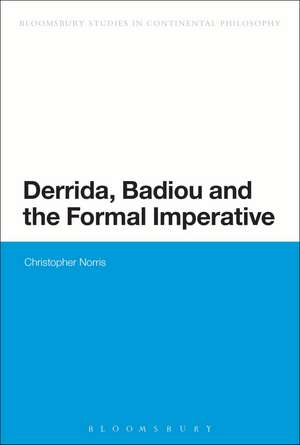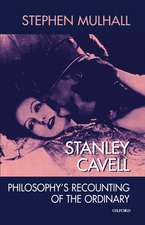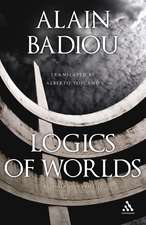Derrida, Badiou and the Formal Imperative: Bloomsbury Studies in Continental Philosophy
Autor Professor Christopher Norrisen Limba Engleză Paperback – 12 feb 2014
| Toate formatele și edițiile | Preț | Express |
|---|---|---|
| Paperback (1) | 236.37 lei 6-8 săpt. | |
| Bloomsbury Publishing – 12 feb 2014 | 236.37 lei 6-8 săpt. | |
| Hardback (1) | 889.71 lei 6-8 săpt. | |
| Bloomsbury Publishing – aug 2012 | 889.71 lei 6-8 săpt. |
Din seria Bloomsbury Studies in Continental Philosophy
- 14%
 Preț: 179.26 lei
Preț: 179.26 lei - 23%
 Preț: 179.10 lei
Preț: 179.10 lei - 13%
 Preț: 238.22 lei
Preț: 238.22 lei - 31%
 Preț: 772.98 lei
Preț: 772.98 lei - 30%
 Preț: 773.39 lei
Preț: 773.39 lei - 14%
 Preț: 888.65 lei
Preț: 888.65 lei - 22%
 Preț: 772.98 lei
Preț: 772.98 lei - 13%
 Preț: 258.33 lei
Preț: 258.33 lei - 23%
 Preț: 256.02 lei
Preț: 256.02 lei - 30%
 Preț: 715.00 lei
Preț: 715.00 lei -
 Preț: 255.66 lei
Preț: 255.66 lei - 22%
 Preț: 773.06 lei
Preț: 773.06 lei - 14%
 Preț: 891.10 lei
Preț: 891.10 lei - 30%
 Preț: 774.20 lei
Preț: 774.20 lei - 13%
 Preț: 257.97 lei
Preț: 257.97 lei - 30%
 Preț: 715.00 lei
Preț: 715.00 lei - 22%
 Preț: 774.62 lei
Preț: 774.62 lei - 13%
 Preț: 256.20 lei
Preț: 256.20 lei -
 Preț: 256.59 lei
Preț: 256.59 lei - 22%
 Preț: 257.50 lei
Preț: 257.50 lei - 13%
 Preț: 257.03 lei
Preț: 257.03 lei - 13%
 Preț: 257.68 lei
Preț: 257.68 lei - 13%
 Preț: 258.15 lei
Preț: 258.15 lei - 30%
 Preț: 715.19 lei
Preț: 715.19 lei - 13%
 Preț: 256.49 lei
Preț: 256.49 lei - 22%
 Preț: 891.10 lei
Preț: 891.10 lei -
 Preț: 255.94 lei
Preț: 255.94 lei - 13%
 Preț: 236.45 lei
Preț: 236.45 lei - 30%
 Preț: 714.92 lei
Preț: 714.92 lei - 30%
 Preț: 773.81 lei
Preț: 773.81 lei - 22%
 Preț: 772.98 lei
Preț: 772.98 lei - 22%
 Preț: 889.08 lei
Preț: 889.08 lei - 30%
 Preț: 714.61 lei
Preț: 714.61 lei -
 Preț: 256.59 lei
Preț: 256.59 lei - 14%
 Preț: 772.98 lei
Preț: 772.98 lei - 22%
 Preț: 257.68 lei
Preț: 257.68 lei - 22%
 Preț: 891.75 lei
Preț: 891.75 lei - 30%
 Preț: 773.81 lei
Preț: 773.81 lei
Preț: 236.37 lei
Preț vechi: 272.08 lei
-13% Nou
Puncte Express: 355
Preț estimativ în valută:
45.24€ • 47.05$ • 37.34£
45.24€ • 47.05$ • 37.34£
Carte tipărită la comandă
Livrare economică 14-28 aprilie
Preluare comenzi: 021 569.72.76
Specificații
ISBN-13: 9781472525925
ISBN-10: 1472525922
Pagini: 208
Ilustrații: black & white illustrations
Dimensiuni: 156 x 234 x 11 mm
Greutate: 0.3 kg
Editura: Bloomsbury Publishing
Colecția Bloomsbury Academic
Seria Bloomsbury Studies in Continental Philosophy
Locul publicării:London, United Kingdom
ISBN-10: 1472525922
Pagini: 208
Ilustrații: black & white illustrations
Dimensiuni: 156 x 234 x 11 mm
Greutate: 0.3 kg
Editura: Bloomsbury Publishing
Colecția Bloomsbury Academic
Seria Bloomsbury Studies in Continental Philosophy
Locul publicării:London, United Kingdom
Caracteristici
Norris is a world-leading authority on Derrida and a highly respected and renowned academic
Notă biografică
Christopher Norris is Distinguished Research Professor in Philosophy at the University of Cardiff, Wales, UK.
Cuprins
Acknowledgments \ Introduction \ 1. Diagonals: Truth-Procedures in Derrida and Badiou \ 2. Badiou: Truth, Ethics and the Formal Imperative \ 3. Deconstruction, Logic and "Ordinary Language": Derrida on the Limits of Thought \ 4. Tractatus Mathematico-Politicus: Badiou's Being and Event \ 5. Of Supplementarity: Derrida on Truth, Language, and Deviant Logic \ 6. Summa Pro Mathematica: Further Perspectives on Being and Event \ Notes \ Index of Names
Recenzii
Christopher Norris crosses the 'dividing line' between the analytic and the continental tradition in philosophy with ingenuity, insightfulness and flair. Understanding the strengths and the limitations of both traditions, he promotes a philosophical culture of communication and mutual influence. Where others find gaps and chasms, Norris builds bridges and looks for a synthesis of the various perspectives on philosophical problems. His firm realist stance makes it clear that aiming for rapprochement does not imply philosophical neutrality or indifference. In Derrida, Badiou and the Formal Imperative, Norris offers a comparative study of the work of Jacques Derrida and Alain Badiou, two very influential thinkers inside and outside the academia, and articulates the rich idea of a 'formal imperative' permeating their thought. Unearthing their concern (more obviously for Badiou, less so for Derrida) with aspects of the formal-logical structures of language and their relations to the world, Norris offers a novel and lively narrative which re-examines and re-positions the philosophical ouvre of the two French philosophers. This book masterfully shows that good philosophy transcends dividing lines and can bring together high standards of argumentative rigour, historical sensitivity, and speculative exploration of the conceptual space.
There is no other current work that so persuasively demonstrates that the way out of the current impasses of philosophy and towards a more open-minded and communicative philosophic culture is to overcome the assumption that the analytical and the creative are axiomatically at odds with each other. The book is a major contribution in the overcoming of the still pervasive 'two cultures' mentality.
There is no other current work that so persuasively demonstrates that the way out of the current impasses of philosophy and towards a more open-minded and communicative philosophic culture is to overcome the assumption that the analytical and the creative are axiomatically at odds with each other. The book is a major contribution in the overcoming of the still pervasive 'two cultures' mentality.


















